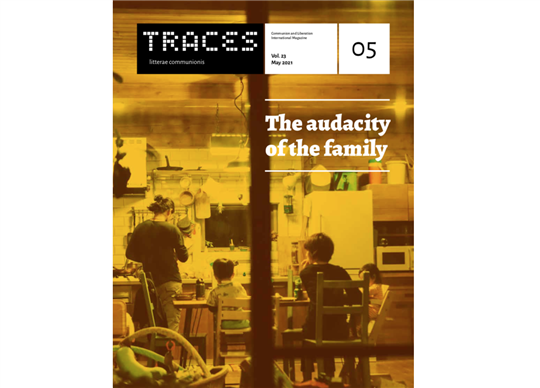
Traces, N.5, May 2021
Human affairsWe do not want to look at the family and its inner workings under a microscope, but rather to open a window onto the horizon that allows it to breathe. The family, fragile and irreplaceable. Today, the attempt to “protect human affairs from their frailty” denounced by Hannah Arendt has become unthinkably stifling because of the long wake of the pandemic. In this period, the four walls of our houses have seen everything: work, school, and a shared life to which no one was accustomed. They housed suffering and joy, and relationships were left raw, burned up in reciprocal presumption, or were given anew. The brightest images are those of fathers and mothers on work calls or standing over the stove with a child in arms. The darkest struggles, however, are not always seen or discussed–we found ourselves “exposed,” “reduced to bare bones,” as described by the witnesses in this issue, which is dedicated to the family–that place in life that is, by nature, extraordinary in its ordinariness.
Today, to see a joyful family is a real event. Why? Because now, more than ever, we see the two alternatives we are always choosing between: “From nature, the terror of death; and from grace, audacity”, as St. Thomas Aquinas put it, and as Charles Péguy echoed six hundred years later: “To hope, you would have to be quite fortunate, to have obtained, received a great grace.” A grace that has nothing magic about it. When it comes to family life, there is either very concrete grace, brazen and patient, or it doesn’t exist. The stories you will read inside are not of heroic families, but of families who would not exist if they had been alone, families who are generated by that horizon of a greater love experienced within the Christian community. We see the effects: a person who grows enough in trust to “have a family”–to marry, bring children into the world, and even welcome others’ children–who has the audacity not only to begin, but above all to continue, to carry on, even when money or health is lacking, or when the routine becomes suffocating. The stories you will find in the following pages help us to grasp what is at the heart of even the largest family: “The encounter between man and woman cannot be defined exclusively by the aim of having children,” Giussani writes, “but first and foremost by being a companionship to destiny.”
It is only with this intense outlook, that of a person walking toward his or her fulfillment, that everything tirelessly starts over again for the family. So that this can happen, you seek a companionship outside your home that makes it possible to love, and although wounds do not heal, they open you to live more authentically and to not close in on yourselves. “Is taking a risk reasonable? It depends on who you have encountered,” said Fr. Julián Carrón during the recent CL Fraternity Exercises, communicating a fullness of life that grows if it enters into everything.